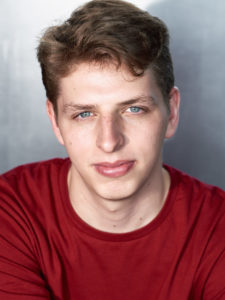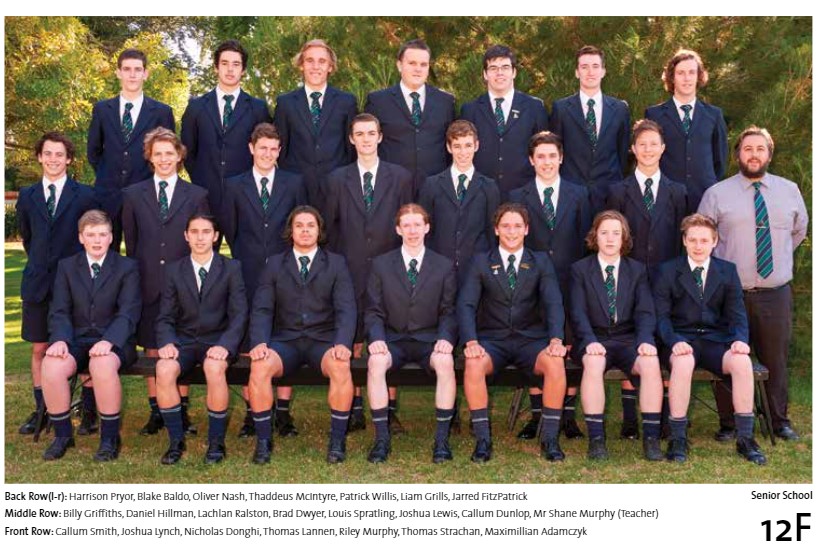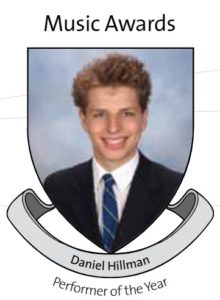Where are they now – Daniel Hillman (SPC 2011-16)
May 31, 2021
The College reconnected recently with Daniel Hillman (SPC 2011-16) who is sharing his love of the theatre while making a difference while working with an award-winning touring theatre company and educating primary and secondary school students on the important topics of cyber safety, anti-bullying and personal wellbeing.

Daniel Hillman.
Where has life taken you since leaving SPC?
Since leaving SPC, I had the absolute pleasure of studying a Bachelor of Acting for Stage and Screen at the Federation University Arts Academy. For three years, I would attend classes from 10am-6pm five days a week to study acting, singing and dancing. It was intense, and during those years I had my fair share of tears, sweat, and laughs. The Arts Academy was like having a second family, and throughout my time there I was able to form relationships that I will certainly cherish for the rest of my life.
After graduating uni, I commenced work with Brainstorm Productions; one of the biggest educational theatre companies in Australia.
Founded 35 years ago, Brainstorm Productions is an award-winning touring theatre company that presents original work to both Primary and High Schools, covering the topics of Cyber Safety, Anti-Bullying and Student Wellbeing.
Working with Brainstorm, I have not only had the opportunity to travel around Australia, but have also had the chance to feel like I’m making a difference. I have always found education through art to be an area of interest, and with Brainstorm I have seen just how successful and potent that form of education can be. The beautiful thing about the shows we perform is that they’re universal to children and teenagers of all backgrounds. Even though the shows have moments of humor and silliness (and plenty of song and dance in the Primary school show) the stories never stray far from the people within the story. The plays are real. They focus on the hardships, the challenges, and the absolute joys of human existence. There’s a truth in the stories Brainstorm tells, and that connects with kids infinitely more than a cheap gimmick or a nasty fear tactic.
This year alone, I have had the opportunity to perform over 100 shows with Brainstorm Productions, to a combined audience of around 20,000 students.
Do you have family ties with SPC?
Both sides of my family have had a history with St Patrick’s College, reaching as far back as my grandfathers Merv Lewis and Patrick Hillman.
After returning from WWII, Merv Lewis became a photographer in Ballarat, and was responsible for taking many of the old photos that can still be seen around the school grounds. In particular, Merv was the photographer behind the school photo where the alleged ghost of Brother O’Malley can be seen in one of the school windows. This photo, and the story behind it, was discussed frequently during my junior school years, and I always felt a certain degree of pride that a relative was one of the major players of the tale. I encourage all current students to track down the photo in the school halls themselves, and come up with their own theories about the infamous photo.
Patrick Hillman was a border during his time at St Pat’s, before studying teaching at the Bendigo Teachers College. As a teacher, Patrick frequently travelled to different parts of Victoria, before eventually ending up in Mildura, where he took over the management of a family vineyard.

Daniel Hillman, pictured in his Year 12 class photograph in 2016.
What are your fondest memories of your time at St Patrick’s College?
During my time at St Pat’s, I often joked that my favorite thing about going to school was having the excuse to hang out with friends. Looking back now at that joke through the combined lenses of post-high school, post-University, and post-2020 lockdowns, I think there’s a deep truth behind it.
SPC was a school, but as much as anything it was also a community. Every day you would go to school, you would meet your friends in the corridors, and then throughout the next five to six hours you would grow and learn alongside them.
Sure, you would get recess and lunch to chat and hang out, but you would also often get to spend class time together, and those are the memories that I hold the dearest. Thinking back now I can think of so many beautiful moments that took place in a classroom: The last-minute check ins before a test, the group presentations that would fall apart in the most spectacular ways, the stifled laughs over something someone said. It was fun! Being able to work alongside a friend can completely change your opinions on a subject or a class. When I think back to all the classes that I struggled with or didn’t enjoy as much, it was almost always because I didn’t have any friends present to share the load with. When I was working alone, I was bored, distracted and uninterested. When I was with mates, I was excited for class, invested in my work and eager to learn.
Which teacher from your time at SPC had the greatest impact on you? Why?
The teacher that had the biggest impact on me during my time at St Pat’s was Mr Greg Shawcross, who taught me theatre studies from Year 7 all the way to Year 12. Being the only consistent teacher for the entirety of my time at St Pat’s, I felt like I really got the chance to grow alongside his education, and it was through Mr Shawcross’ teaching that I discovered my love of the arts. Mr Shawcross was able to create an environment in all of his classes that both allowed fun, but also rewarded hard work. In this environment, every student had the opportunity to discover what it is they love about performance (and to a wider degree artistic expression), and then had the opportunity to refine and improve these skills in a friendly environment where you didn’t have to worry about the looming fears of failure.
Another teacher who had a massive impact on me at St Pat’s was Mr Michael Brady. Coming into Year 7, I felt very anxious and apprehensive about my new environment. I was a very shy kid, and everything was going to be different, and there were going to be so many new people that I would have to meet and create friendships with. Fortunately, I was welcomed into my high school life by Mr Michael Brady, whom was both my home room teacher, and my English teacher. Through kindness, humor and spirit, Mr Brady helped me come out of my shell, and sent me on the path to become the person that I am today.
How has your education shaped your professional life?
My education at SPC has shaped my professional life in countless ways.

Daniel Hillman was recognised as “Performer of the Year” in the 2015 College Annual.
At the forefront, I obviously must mention that taking certain subjects helped shape and develop my professional life as an artist. As discussed in a previous question, studying theatre studies under Mr Greg Shawcross helped shape my basic understanding and appreciation of performance, but I would also love to give special mentions to studying English under Miss Sarah Slater, and studying Media under Ms Belinda Lees and Mr Peter Hutchins.
In my time since leaving St Pat’s, I have had the opportunity to write two original shows that were performed at Uni, as well as a series of monologues and scenes that were developed and performed in a workshop setting throughout 2020. Every writer works differently, but a common ground between all writers is an understanding of language. In year 12, we were assigned three very different texts to study: Medea, The Lieutenant and Frankenstein. Whilst each fantastic in their own way, each text was written in a different era, with completely different themes to explore and develop. Miss Slater, my Year 12 English teacher, was pivotal in my understanding of the three texts, and it was through her hard work that I began to discover the different voices writers could have. Since then, I have been working hard on developing my own voice as a writer, and I have to hold English, and in particular the study of Frankenstein responsible in helping kick off that creative process.
As an actor, the performance itself is the very last step of the process. What comes beforehand is a very long and perilous journey of analysis, research, and contextualization. Every time I look down at a script in front of me, I immediately think back to my time studying Media in Years 11 and 12, and the immense skill Ms Lees and Mr Hutchins held in analysis. They never missed anything, and they could find important points of discussion in almost every shot of any film we watched. The best classes were when they were both in the classroom at the same time, and the banter they would share created an environment that was both hilarious, but also filled with important observations and critiques. I sometimes find script analysis to be a little arduous, but when I think back to the levity and excitement that it came with in high school media, I feel energized and eager to jump back into the world of the script.

Daniel Hillman, pictured in the Concert Band, when he was in Year 9 in 2013.
If you could pass on one message to the students of today, what would it be?
I think the one message I would pass on to students today (and one message that I wish I had learnt sooner in my own life) is to find the love in everything you do.
In a school environment, learning can sometimes be hard. Especially if it’s a subject you don’t have much interest in, or if it’s a subject that’s proving difficult to keep on top of.
In my time, I have discovered that there are two different ways to learn; I’ve named them ‘spite learning’ and ‘love learning’.
‘Spite learning’, or weightlift learning, requires so much effort and energy. You’ll treat a math question or an essay prompt like it’s the heaviest object in the universe. You’ll tense every fiber of your being as you try and tackle the question and you’ll exhaust yourself in the process. This method is how we often treat subjects we ‘hate’, and what it does is it accidentally causes us to dislike the subject even more. There’s no love or joy here, we are tackling these problems because ‘we have to’, not because ‘we want to’. This learning method works for some people, but it’s unnecessary, and it’s completely unsustainable.
Love learning, or field learning, is like a big open field peeling off into the distance, with the grass being gently rocked back and forth by the wind. This is what I’m talking about when I say ‘find the love’. Find what you enjoy about something, and it becomes easy, it becomes relaxed and it becomes approachable.
English class speeches feel intimidating, but if you really enjoy stand-up comedy then treat it like it’s a set. Add a few jokes here or there and your tension relaxes, your messages become clearer and your voice becomes interesting.
Playing a new sport in P.E can fill some people with dread, but if you can find the love then all of a sudden it doesn’t seem that bad. Don’t worry about immediately being the best player in the class (enforced competition can be the best friend of spite learning). Have fun with it! Run around, kick the ball, get silly when your team wins a point, and maybe even try and break a rule or two (just don’t tell the teacher I suggested that). You’ll likely find that you’re improving far faster than you might have otherwise.
The greatest thing about finding the love is that it extends beyond just school. Find what you love about the hobbies you have, the food you eat, and the music you listen to. Continue to explore these little pockets of enjoyment and you’ll be able to explore further than ever before.
Life should be about having fun, and through love learning I really believe that every student is able to make their journey through school just that little bit brighter.

